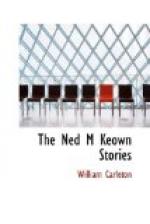THE BATTLE OF THE FACTIONS.
Accordingly, the next evening found them all present, when it was determined unanimously that Pat Frayne, the hedge schoolmaster, should furnish them with the intellectual portion of the entertainment for that night, their object being each to tell a story in his turn.
“Very well,” said Pat, “I am quite simultaneous to the wishes of the company; but you will plaise to observe, that there is clay which is moist, and clay which is not moist. Now, under certain circumstances, the clay which is not moist, ought to be made moist, and one of those circumstances that in which any larned person becomes loquacious, and indulges in narrative. The philosophical raison, is decided on by Socrates, and the great Phelim M’Poteen, two of the most celebrated liquorary characters that ever graced the sunny side of a plantation, is, that when a man commences a narration with his clay not moist, the said narration is found, by all lamed experience, to be a very dry one—ehem!”
“Very right, Mr. Frayne,” replied Andy Morrow; “so in ordher to avoid a dhry narrative, Nancy, give the masther a jug of your stoutest to wet his whistle, and keep him in wind as he goes along.”
“Thank you, Mr. Morrow—and in requital for your kindness, I will elucidate you such a sample of unadulterated Ciceronian eloquence, as would not be found originating from every chimney-corner in this Province, anyhow. I am not bright, however, at oral relation. I have accordingly composed into narrative the following tale, which is appellated ’The Battle of the Factions:’—
“My grandfather, Connor O’Callaghan, though a tall, erect man, with white flowing hair, like snow, that falls profusely about his broad shoulders, is now in his eighty-third year: an amazing age, considhering his former habits. His countenance is still marked with honesty and traces of hard fighting, and his cheeks ruddy and cudgel-worn; his eyes, though not as black as they often used to be, have lost very little of that nate fire which characterizes the eyes of the O’Callaghans, and for which I myself have been—but my modesty won’t allow me to allude to that: let it be sufficient for the present to say that there never was remembered so handsome a man in his native parish, and that I am as like him as one Cork-red phatie is to another. Indeed, it has been often said, that it would be hard to meet an O’Callaghan without a black eye in his head. He has lost his fore-teeth, however, a point in which, Unfortunately, I, though his grandson, have strong resemblance to him. The truth is, they were knocked out of him in rows, before he had reached his thirty-fifth year—a circumstance which the kind reader will be pleased to receive in extenuation for the same defect in myself. That, however, is but a trifle, which never gave either of us much trouble.




